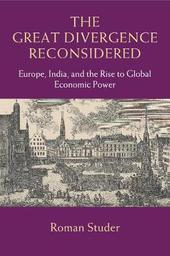
|
The Great Divergence Reconsidered: Europe, India, and the Rise to Global Economic Power
Paperback / softback
Main Details
| Title |
The Great Divergence Reconsidered: Europe, India, and the Rise to Global Economic Power
|
| Authors and Contributors |
By (author) Roman Studer
|
| Physical Properties |
| Format:Paperback / softback | | Pages:243 | | Dimensions(mm): Height 230,Width 152 |
|
| Category/Genre | Asian and Middle Eastern history
Economics
Development economics
Economic history |
|---|
| ISBN/Barcode |
9781107679979
|
| Classifications | Dewey:382.094 |
|---|
| Audience | | Professional & Vocational | |
|---|
| Illustrations |
9 Tables, unspecified; 10 Maps; 30 Line drawings, black and white
|
|
Publishing Details |
| Publisher |
Cambridge University Press
|
| Imprint |
Cambridge University Press
|
| Publication Date |
15 June 2017 |
| Publication Country |
United Kingdom
|
Description
In stark contrast to popular narratives, The Great Divergence Reconsidered shows that Europe's rise to an undisputed world economic leader was not the effect of the Industrial Revolution, and cannot be explained by coal or colonial exploitation. Using a wealth of new historical evidence stretching from the seventeenth to the twentieth century, Roman Studer shows that this 'Great Divergence' must be shifted back to the seventeenth century, if not earlier. Europe was characterized by a more powerful transportation system, bigger trade flows, larger and better integrated markets, higher productivity levels, and superior living standards even before the Industrial Revolution brought about far-reaching structural changes and made Europe's supremacy even more pronounced. While the comparison with Europe draws significantly on India, the central conclusions seem to hold for Asia - and indeed the rest of the world - more generally. An interplay of various factors best explains Europe's early and gradual rise, including better institutions, favorable geographical features, increasing political stability, and increasingly rapid advances in science and technology.
Author Biography
Roman Studer has worked both in academia and in the private sector, and he is currently the chief operating officer of the UBS International Center of Economics in Society at Universitat Zurich. He was a postdoctoral prize research fellow at the University of Oxford and then a lecturer at the London School of Economics and Political Science. He was awarded the Alexander Gerschenkron Prize by the Economic History Association for the best dissertation in international economic history.
Reviews'Adam Smith's central thesis was that efficient markets generate economic growth. This lively book revives the Smithian tradition. Efficient markets create growth, and efficient markets were unique to pre-industrial Europe. This is an important contribution to the debate on why the West rather than the East experienced the Industrial Revolution.' Gregory Clark, University of California, Davis 'The timing of the Great Divergence between the economies of the West and East is one of the 'big' topics of modern economic history. Building on a theoretical framework that goes back to Adam Smith, Roman Studer combines new data and cutting-edge analysis to show - deftly and convincingly - that long before the Industrial Revolution the integration of commodity markets in the West fostered rates of economic growth and living standards higher than anywhere in the East.' Cormac O Grada, University College Dublin 'By foregrounding market integration and the costs of trade, The Great Divergence Reconsidered makes a case for a radical shift in the discourse on the origins of international economic inequality. The sophistication of Roman Studer's arguments and the quality of his statistical analysis make that case compelling. This is undoubtedly a major work.' Tirthankar Roy, London School of Economics and Political Science
|